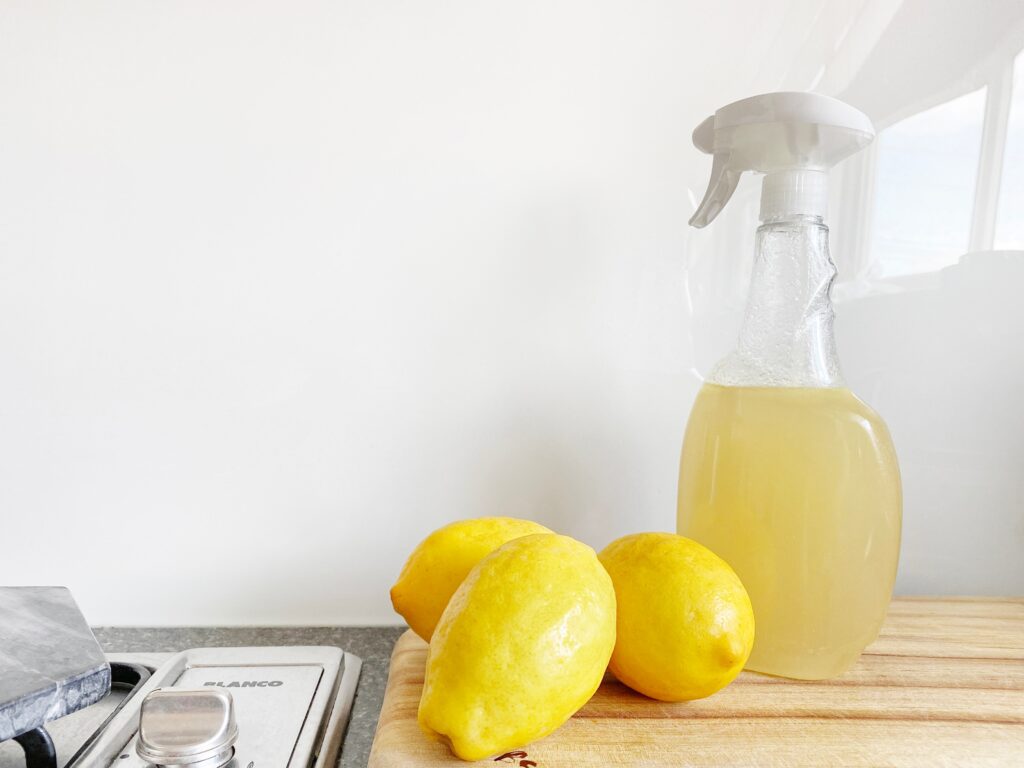Household cleaners are an essential part of our everyday lives. Including paper towels, disinfectant wipes, all-purpose sprays, and sponges, it is impossible to escape using cleaning products in our homes. However, many commercial cleaning products pose environmental hazards and may contain chemicals that are harmful to the health of humans, animals, and plants. Fortunately, it is possible to make simple swaps to mitigate some of these concerns.

How do Household Cleaners Harm the Environment?
Unfortunately, household cleaners are often filled with harsh chemicals. These chemicals can negatively impact their environment during production, aerosolization, or when introduced to waterways. Inadvertently, harmful chemicals are often released into the air or rinsed down the drain during the cleaning process. Although water treatment facilities are able to remove a significant amount of chemical compounds, they are not able to remove the full amount. These chemicals then enter waterways where they accumulate and may negatively impact the environment.
Phosphates found in detergents used for laundry and dish-washing act as fertilizers when introduced to aquatic ecosystems. They cause increased vegetative growth including algae blooms. This increased growth reduces the amount of oxygen available in the water. As oxygen supplies dwindle, it becomes more difficult for fish and other aquatic animals to survive. This leads to a loss in biodiversity in the affected ecosystems.
Additionally, many cleaning products come in single-use plastic packaging, or are designed for only a short period of use. These products are thrown out after use and often placed in landfills. They do not biodegrade once there. Instead, they break down into microplastics. Plastic pollution is one of the most significant issues facing our environment today. Therefore, reducing plastic use is one of the most significant things you can do on a personal level to help combat environmental degradation.
Animal Experimentation and Household Cleaners
Sadly, many companies still use animals when performing testing on household products. According to the Humane Society of the United States, “household products (such as dish soap, laundry detergent and glass cleaner) are typically tested on guinea pigs, rabbits, mice and rats.” Not only is animal testing cruel, little of the data it provides is meaningfully applicable to humans. There are many existing alternatives to animal testing which should be adopted. When picking household cleaners, be sure to choose products that are cruelty-free.
Ways to make cleaning your home more eco-friendly
DIY and Up-cycle to Make Your Own Cleaning Products
Replacing some cleaning products with up-cycled, DIY, or reusable alternatives can make your cleaning routine much greener. Luckily, you only need a few household staples to make your own all-purpose cleaner, reusable paper towels, and scouring powder.
1. All-Purpose cleaner:
Combine 1 cup white vinegar and 1 cup lukewarm water. Add 15-20 drops of lemon essential oil. Then, shake to combine. This product will separate, so be sure to shake before use.
2. Reusable Paper towels:
If you have an old cotton t-shirt or pillowcase laying around, this is a great up-cycling project! First, wash the fabric in warm water so that it will shrink completely. Next, cut the fabric into roughly equal pieces and hem the edges. That’s it! You have now created reusable cleaning rags. Toss them in the washing machine after each use.
3. Scouring Powder:
Use baking soda as a replacement for Comet and other scouring powders! Simply sprinkle baking soda in the tub or sink, scrub, and wipe up with a damp rag.
Replace Plastic Packaging and Products with Sustainable Options
Plastic pollution is an ever-increasing environmental concern. Plastic is most often created from fossil fuels, and does not biodegrade. This makes it a double whammy in terms of environmental impact. By reducing plastic use, we can curb demand and, more importantly, help keep harmful plastics out of the environment.
Creating your own DIY cleaners can reduce the amount of plastic used. By making DIY all purpose spray and storing it in a reusable container, harmful single use plastic waste is reduced. However, there are some other ways to help decrease the amount of plastic used while cleaning.
First, look for products that are not made of plastic. Common cleaning products, such as sponges, are frequently plastic-based. Sponges are most commonly made from a mix of cellulose and plastic. This means that as they deteriorate, they release microplastics. Also, sponges will not biodegrade in landfills. Fortunately, many biodegradable options exist that can replace plastic products. Plant-based sponges, reusable cotton sponges, and scrub brushes made from natural materials are great, plastic-free replacements.
Other examples of single use plastics commonly seen in cleaning supplies include dish and hand soaps. These soaps are typically housed in plastic containers. Instead, consider using bar soaps, or refillable pumps! Companies such as Grove Collaborative sell soap refills that come in aluminum containers instead of plastic. Aluminum can be recycled an unlimited number of times. This makes it a superior alternative to plastic, which can only be recycled a few times. Many health food stores also sell Castile Soap in bulk. This multi purpose soap can be used to wash hands or dishes. Additionally, recent years have seen a growing number of dedicated home refill stores. These stores sell household cleaners in bulk and encourage customers to bring their own refillable containers.
Other Benefits of Creating a Greener Cleaning Routine
Not only does creating a more environmentally friendly cleaning routine help the environment, it also helps keep your household healthy! Many cleaning products are created with chemicals that can be toxic to pets and humans. They can cause skin, eye, and throat irritation. Pets and children may risk additional exposure to these chemicals as they are more likely to inadvertently ingest them. Creating a cleaning routine that cuts out chemicals not only helps the environment, but also helps limit exposure to harmful chemicals.
Get more like this—Sign up for our daily inspirational newsletter for exclusive content!
__
Photo: Precious Plastic Melbourne via Unsplash




